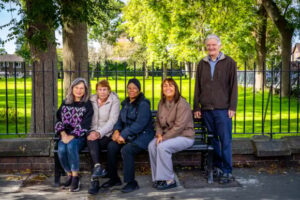Age UK is urging people to do what they can to help older people to get through this spell of cold weather safely.
The charity said severe weather can cause disruption while the snow and ice could mean that some older people will struggle to get to their allotted appointments at vaccination centres. Getting to an appointment too early can also result in spending time outside in the severe cold.
Age UK is advising older people to plan ahead if they going out, as paths and roads may be icy and slippy. It is better to be safe than sorry, so if there are any concerns about going outside when the weather is treacherous, ask family, friends or even trusted neighbours to help to buy shopping.
Often people are only too happy to help. There will also be other opportunities to have the vaccination at another time.
Caroline Abrahams, charity director at Age UK, said: ‘Rather than battling the elements and putting health at risk it would be better to call your GP to see what the alternative vaccination arrangements are being made locally.
‘It’s important to remember that Covid-19 vaccination is not a one-off opportunity: if for any reason you can’t take the first appointment you’re offered there will be other opportunities later on, possibly in a range of nearby settings.
‘Even though our capacity to support older relatives, friends and neighbours during this cold snap is impeded to a degree by the current lockdown but there are still things we can all do.
‘Offering to bring some shopping can be a real help during winter months particularly during severe weather. Even simple things like ensuring they are keeping warm and protecting themselves against the risks the cold weather poses can really help.’
Age UK said exposure to the cold could have a severe impact on older people because ageing bodies find it harder to adjust to big changes in temperature, specifically if they are coping with ill health or living in housing that costs a lot to heat.
For example, the cold raises blood pressure, which in turn increases the risk of a heart attack or stroke, and breathing in cold air can also increase the risk, and impact, of serious illnesses like flu and pneumonia.
Simple precautions such as wrapping up warm when going outside, sleeping with the windows closed at night and having plenty of hot food and drinks throughout the day can help keep these risks at bay.
How we can help
1. Lend a hand
Ask if people have everything they need. If you’re feeling well, offer to pick up food shopping or medicines for an older neighbour or relative who might not be able to or is too worried to go to the shops. Make sure you stand two metres away from them at all times.
2. Make sure they can get about safely both inside and out
When it’s icy or wet outside, it’s easier to slip and fall. Helping to keep paths and driveways clear and salting steps and slopes could make a big difference. Grit paths and driveways with a salt and sand mixture available from DIY stores and some Garden Centres.
3. Keep in touch
Covid-19 restrictions on top of darker nights and miserable weather can make it harder for older people to get out and can leave them feeling lonely and a bit down.
Phone or digitally message older relatives and friends to ask if they need anything and let them know if they do, you can help out. Have a chat with them. Set up a rota with other family and friends to make sure someone is regularly calling to see if they are OK.
4. If they are feeling low – encourage them to reach out
Listen to a person’s worries. If anyone has been feeling low and out of sorts for several weeks and making them listless and lacking in energy, it’s very important they share these feelings with someone – perhaps a friend, family member or GP.
Call Age UK’s befriending services to help combat feelings of being alone. Visit: https://www.ageuk.org.uk/services/befriending-services/sign-up-for-telephone-befriending/
Top tips for staying warm and well
· Heat your home to a comfortable temperature throughout the day. Age UK recommends a minimum of 18C. Check your thermostat or use a room thermometer to monitor the temperature.
· Keep your bedroom window shut at night. Breathing in cold air can increase the risk of chest infections.
· Keep moving and when you are indoors try not to sit still for more than an hour, if you can get up. Walk around or make a hot drink.
· Eat well. It’s important to eat well, especially in the winter. Have at least one hot meal a day and have regular hot drinks, as they help to keep you warm. Also stock up on basic food items in case of a cold snap and you can’t get out.
· Stay stocked up on medication. When the forecast says snow and sub-zero temperatures are on the way, check you have enough medication to last you and order repeat prescriptions in plenty of time. Ask your local pharmacy if it offers a prescription pick-up and delivery service. Keep simple cold and sore throat remedies in your medicine cabinet to treat minor illnesses when they strike.
When severe weather strikes
1. Keep up to date with the weather forecast – warnings are issued by the Met Office when the winter weather is most likely to have a significant impact on people’s health Sign up for alerts here.
2. Report a power cut by calling 105, which is free from landlines and mobiles. It is an emergency number who will be able to direct you to your electricity network operator.
3. Keep a torch handy at home in case of a power cut, and keep emergency numbers where you can find them easily. Register with your supplier so they’ll call you in the event of a power cut.
4. If you have a mobile phone keep it handy and make sure that it is charged and turned on so that you can keep in touch with your family, even if they don’t live nearby. Most mobile phones also have handy torches built in.
Find a local Age UK in your area here.
Photo Credit – Pixabay















Leave a Reply